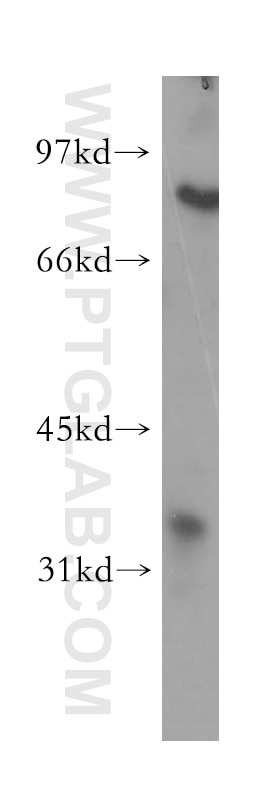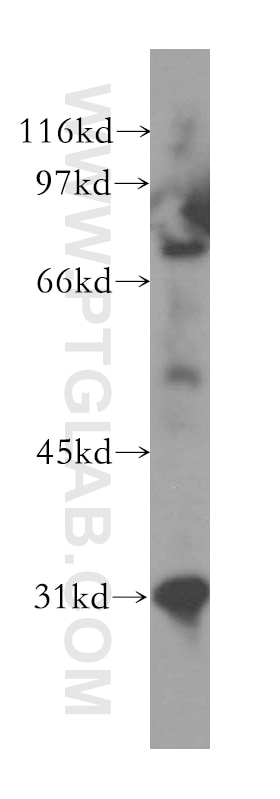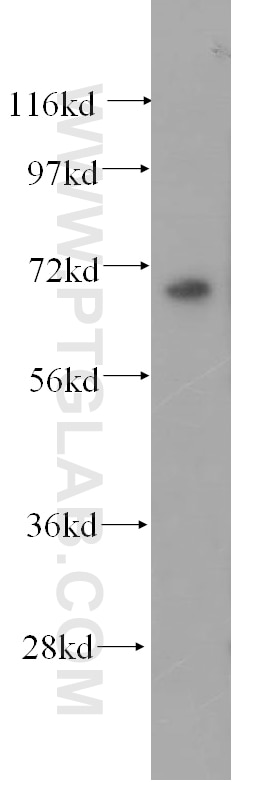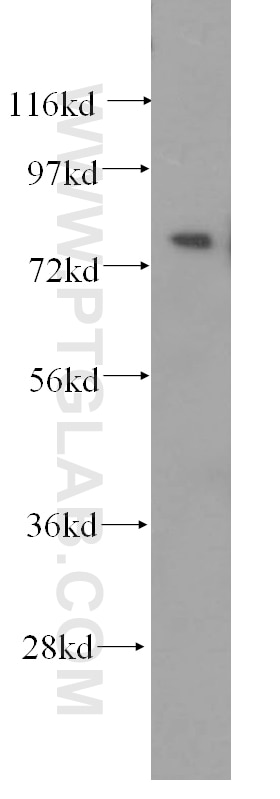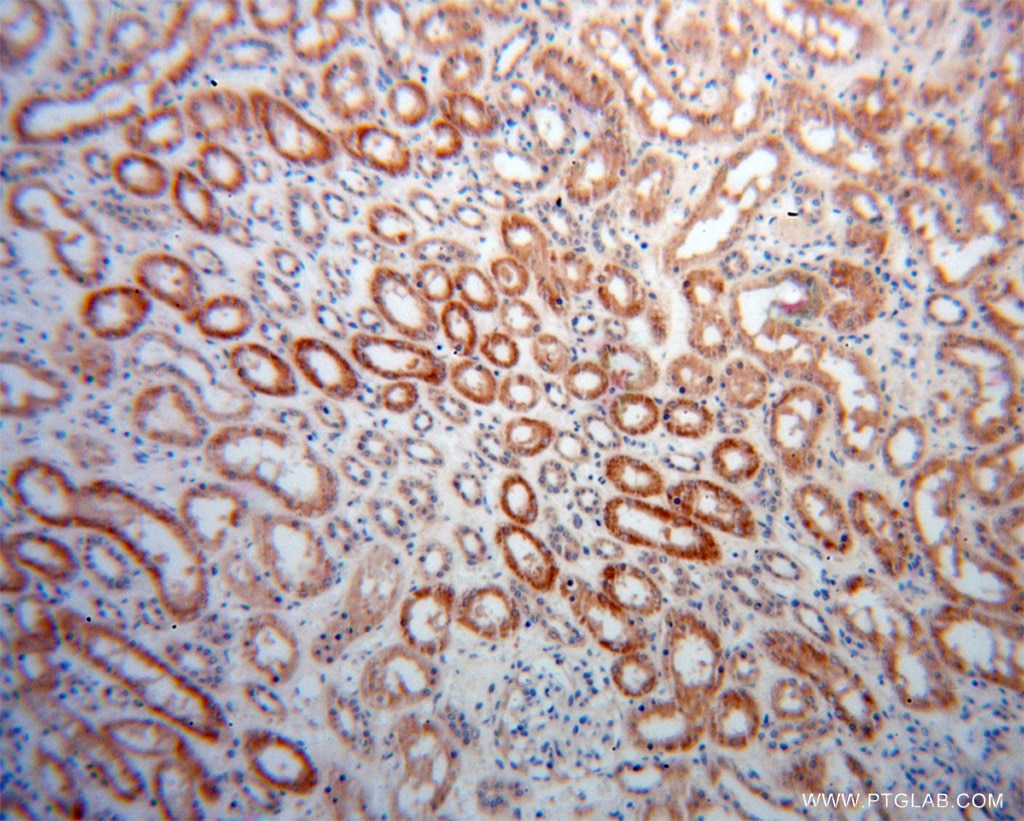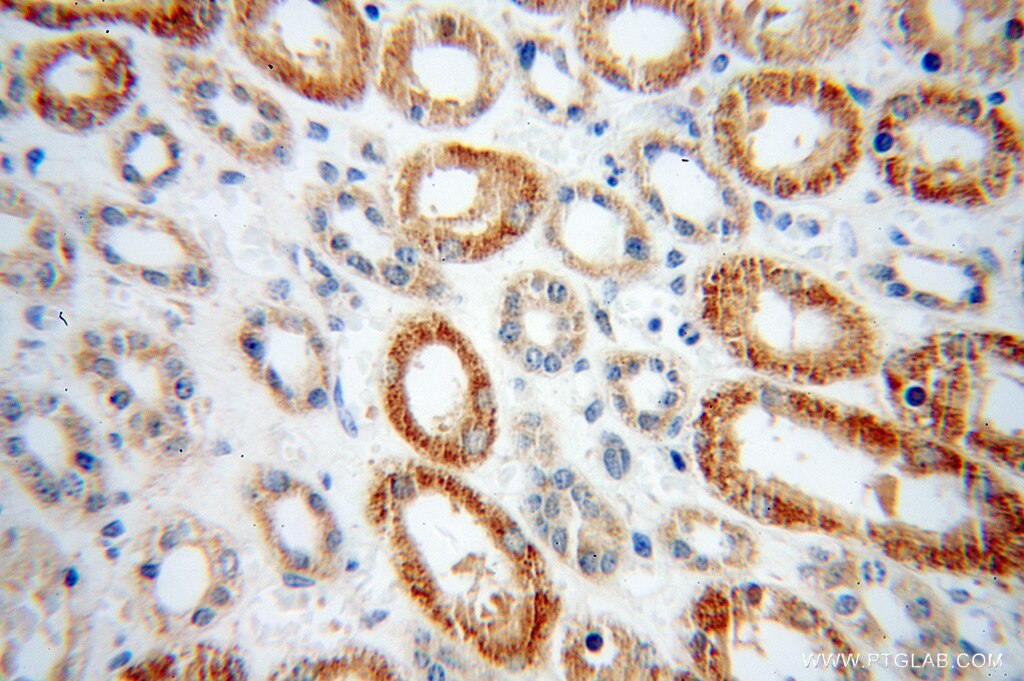Anticorps Polyclonal de lapin anti-PHYH
PHYH Polyclonal Antibody for WB, IHC, ELISA
Hôte / Isotype
Lapin / IgG
Réactivité testée
Humain, rat, souris et plus (1)
Applications
WB, IHC, ELISA
Conjugaison
Non conjugué
N° de cat : 12858-1-AP
Synonymes
Galerie de données de validation
Applications testées
| Résultats positifs en WB | tissu hépatique humain, cellules HEK-293, cellules Jurkat, tissu rénal humain |
| Résultats positifs en IHC | tissu rénal humain il est suggéré de démasquer l'antigène avec un tampon de TE buffer pH 9.0; (*) À défaut, 'le démasquage de l'antigène peut être 'effectué avec un tampon citrate pH 6,0. |
Dilution recommandée
| Application | Dilution |
|---|---|
| Western Blot (WB) | WB : 1:500-1:2000 |
| Immunohistochimie (IHC) | IHC : 1:20-1:200 |
| It is recommended that this reagent should be titrated in each testing system to obtain optimal results. | |
| Sample-dependent, check data in validation data gallery | |
Applications publiées
| WB | See 5 publications below |
| IHC | See 1 publications below |
Informations sur le produit
12858-1-AP cible PHYH dans les applications de WB, IHC, ELISA et montre une réactivité avec des échantillons Humain, rat, souris
| Réactivité | Humain, rat, souris |
| Réactivité citée | rat, porc, souris |
| Hôte / Isotype | Lapin / IgG |
| Clonalité | Polyclonal |
| Type | Anticorps |
| Immunogène | PHYH Protéine recombinante Ag3569 |
| Nom complet | phytanoyl-CoA 2-hydroxylase |
| Masse moléculaire calculée | 39 kDa |
| Poids moléculaire observé | 36 kDa, 70 kDa |
| Numéro d’acquisition GenBank | BC029512 |
| Symbole du gène | PHYH |
| Identification du gène (NCBI) | 5264 |
| Conjugaison | Non conjugué |
| Forme | Liquide |
| Méthode de purification | Purification par affinité contre l'antigène |
| Tampon de stockage | PBS avec azoture de sodium à 0,02 % et glycérol à 50 % pH 7,3 |
| Conditions de stockage | Stocker à -20°C. Stable pendant un an après l'expédition. L'aliquotage n'est pas nécessaire pour le stockage à -20oC Les 20ul contiennent 0,1% de BSA. |
Informations générales
PHYH (Phytanoyl-CoA 2-hydroxylase), also known as Phytanic acid oxidase or Phytanoyl-CoA alpha-hydroxylase, is a peroxisomal enzyme which converts phytanoyl-CoA to 2-hydroxyphytanoyl-CoA. It catalyzes the first step in the alpha-oxidation of phytanic acid, a branched-chain fatty acid. Mutations in this gene can cause Refsum disease (RD) and deficient protein activity can cause Zellweger syndrome and rhizomelic chondrodysplasia punctata. This antibody (12858-1-AP) detects two bands: 36kd and 70kd. The 70kd band may probably be the dimeric form of PHYH.
Protocole
| Product Specific Protocols | |
|---|---|
| WB protocol for PHYH antibody 12858-1-AP | Download protocol |
| IHC protocol for PHYH antibody 12858-1-AP | Download protocol |
| Standard Protocols | |
|---|---|
| Click here to view our Standard Protocols |
Publications
| Species | Application | Title |
|---|---|---|
PLoS Genet Tysnd1 deficiency in mice interferes with the peroxisomal localization of PTS2 enzymes, causing lipid metabolic abnormalities and male infertility. | ||
Oncotarget Proteomics and metabolomics analysis of hepatic mitochondrial metabolism in alcohol-preferring and non-preferring rats. | ||
Sci Rep Proteomics analysis reveals the effect of 1α,25(OH)2VD3-glycosides on development of early testes in piglets. | ||
J Ethnopharmacol Isobaric tags for relative and absolute quantitation (iTRAQ)-based proteomics for the investigation of the effect of Hugan Qingzhi on non-alcoholic fatty liver disease in rats. | ||
J Hepatocell Carcinoma Liver Regeneration-Related Genes of Nontumor Liver Tissues Predict the Prognosis of Patients with Hepatocellular Carcinoma |
